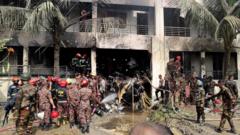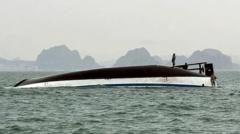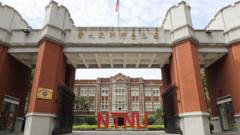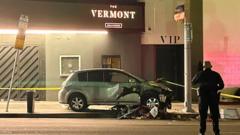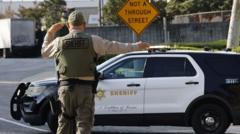The report into the Jeju Air crash has ignited a deep controversy as families advocate for a broader examination of contributing factors in the tragedy.
**Families Demand Accountability After Jeju Air Crash Report Attributes Blame to Pilot**

**Families Demand Accountability After Jeju Air Crash Report Attributes Blame to Pilot**
Families of crash victims express outrage over investigative findings that focus on pilot error while disregarding critical safety issues.
Families of victims from December's tragic Jeju Air crash are expressing fierce opposition to a recently released investigative report that attributes primary blame to pilot error. The report, which was scheduled for public release over the weekend, faced delays due to protests from the victims’ families, who argue that investigators are unfairly singling out the pilot while neglecting significant safety shortcomings.
The disaster, which resulted in 179 fatalities out of 181 passengers on board, occurred when Jeju Air Flight 2216 crashed into a concrete barrier shortly before landing at Muan International Airport—the deadliest aviation incident in South Korea's history. The flight was approaching the runway on the morning of December 29 when the pilots reported a bird strike and called for emergency assistance. They attempted to land from an alternate direction, only to make a belly landing without lowered landing gear, leading to the catastrophic impact.
According to the report by South Korea's Aviation and Railway Accident Investigation Board, the pilots mistakenly shut down the left engine, which was undamaged, rather than the right engine, which had sustained damage from the bird strike. However, grieving families assert that the report overlooks the crucial role of the concrete barrier, arguing that its presence contributed greatly to the severity of the accident.
“The bereaved families seek a fair and transparent investigation into the accident,” they stated, calling for a press briefing only after a thorough and unbiased inquiry is conducted. The Jeju Air pilots' union echoed this sentiment, criticizing the focus on pilot error while discounting other contributing factors.
Despite the familial outcry, sources close to the investigation conveyed that the findings would not be altered, citing comprehensive evidence backing their conclusions. In the aftermath of the crash, South Korea's transport ministry announced plans to remove concrete barriers from seven airports to enhance safety measures.
In addition, families of the victims have filed a criminal complaint against Jeju Air CEO Kim E-bae, alleging professional negligence, with the CEO among 24 individuals currently under police investigation for their involvement in the incident.
The disaster, which resulted in 179 fatalities out of 181 passengers on board, occurred when Jeju Air Flight 2216 crashed into a concrete barrier shortly before landing at Muan International Airport—the deadliest aviation incident in South Korea's history. The flight was approaching the runway on the morning of December 29 when the pilots reported a bird strike and called for emergency assistance. They attempted to land from an alternate direction, only to make a belly landing without lowered landing gear, leading to the catastrophic impact.
According to the report by South Korea's Aviation and Railway Accident Investigation Board, the pilots mistakenly shut down the left engine, which was undamaged, rather than the right engine, which had sustained damage from the bird strike. However, grieving families assert that the report overlooks the crucial role of the concrete barrier, arguing that its presence contributed greatly to the severity of the accident.
“The bereaved families seek a fair and transparent investigation into the accident,” they stated, calling for a press briefing only after a thorough and unbiased inquiry is conducted. The Jeju Air pilots' union echoed this sentiment, criticizing the focus on pilot error while discounting other contributing factors.
Despite the familial outcry, sources close to the investigation conveyed that the findings would not be altered, citing comprehensive evidence backing their conclusions. In the aftermath of the crash, South Korea's transport ministry announced plans to remove concrete barriers from seven airports to enhance safety measures.
In addition, families of the victims have filed a criminal complaint against Jeju Air CEO Kim E-bae, alleging professional negligence, with the CEO among 24 individuals currently under police investigation for their involvement in the incident.


